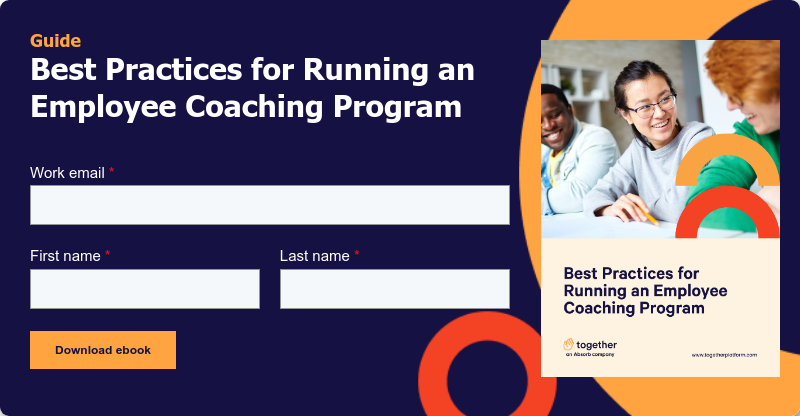In many organizations, HR professionals are the ones administrating coaching and mentoring programs. Ironically, they’re also often the ones that could benefit most from corporate coaching.
Gartner data shows that only 9% of HR teams are able to combine high functional efficiency with strong alignment to business needs. This suggests a significant opportunity for HR departments to enhance their own internal development practices.
Whether it’s learning to navigate a complex career path, preparing for leadership, or handling the emotional demands of the job, HR coaching is a powerful tool for retaining top performers and developing talent. When strategically implemented, human resources coaching goes beyond ad hoc support—it can drive meaningful growth for individuals and the organization.
This blog is your guide to launching and managing a successful human resources coaching program. We’ll explore what HR coaching is, the benefits it offers, and how to get started, while covering key areas like leadership development, executive coaching, and performance coaching.
Let’s dive in!
What is human resources coaching?
Human resources coaching (or HR coaching) is a structured development program where employees—especially those in HR roles or leadership pipelines—receive personalized guidance and support from experienced internal coaches. These coaches may be senior HR professionals, people managers, or external experts brought in to accelerate development in key areas.
Unlike mentoring programs, HR coaching is often goal-oriented, skills-based, and time-bound. It may focus on topics like building influence, navigating organizational change, strengthening leadership skills, or developing performance improvement plans. A robust human resources coaching and mentoring program ensures employees at every level have access to the tools and insights they need to thrive.
There are several formats for HR coaching, including:
- Performance coaching for employees looking to meet or exceed expectations in their current role.
- Leadership development coaching for high-potential employees preparing for leadership roles.
- Coaching for managers to help team leads adopt a coaching style of leadership and manage more effectively.
- Executive coaching for senior leaders looking to refine strategic thinking, decision-making, and organizational influence.
- Coaching for HR professionals to grow HR competencies, manage change, or move into specialized or leadership roles.
Why offer HR coaching?
Because of the unique demands and expectations placed on their roles, career coaching is especially beneficial for HR professionals. Here’s why:
1. Navigating a complex career path
Unlike other functions, HR doesn’t always have a linear progression. Career paths can branch into areas like talent acquisition, organizational development, DEI, employee relations, or HR strategy. Career coaching helps HR professionals clarify their long-term goals, explore options, and identify the skills and experiences needed to advance in the direction they choose.
2. Developing strategic influence
As HR evolves from an administrative role to a strategic business partner, professionals must sharpen their ability to influence leadership, drive organizational change, and align people strategies with business outcomes. Coaching supports this transition by building executive presence, communication skills, and business acumen.
3. Balancing emotional demands
A Sage report found that a staggering 84% of HR leaders frequently experience stress, and 81% reported feeling burnt out.
HR roles are emotionally demanding, dealing with conflict, performance issues, layoffs, and employee well-being. HR coaching offers a confidential space for reflection, stress management, and building resilience, which is essential for avoiding burnout and maintaining effectiveness.
4. Becoming a coach to others
HR is often tasked with coaching managers and employees across the organization. But to coach others effectively, HR professionals need to experience coaching themselves. It deepens their empathy, enhances their mentoring techniques, and gives them a model to replicate.
5. Preparing for leadership
Many HR professionals aspire to leadership roles like HR Director or CHRO. HR career coaching can accelerate this journey by helping them build leadership competencies, navigate internal politics, and step confidently into higher-stakes roles.
In short, career coaching empowers HR professionals to grow into more impactful, strategic leaders—while staying aligned with their personal values and career aspirations.
How to start a human resources coaching program
Ready to launch an HR coaching program in your organization? Here’s a step-by-step framework for success.
1. Define the purpose and scope
Start by clarifying your mentorship goals. Are you focused on HR career coaching? Leadership development? Performance improvement? The clearer your objectives, the easier it will be to design a program that delivers measurable outcomes.
Also consider your audience. Will the program be open to all employees, targeted at specific functions (like HR), or designed for high potentials or new managers?
2. Identify and train your coaches
In HR coaching and mentoring, your internal coaches are your most valuable resource. These may be experienced leaders, senior HR professionals, or even high-performing managers. Offer training on how to be an effective coach, including active listening, goal setting, and confidentiality.
You can also supplement internal coaches with external ones—especially for executive coaching or sensitive development areas.
3. Match coachees and coaches thoughtfully
Matching matters. The most effective programs use coaching platforms that leverage data to pair coaches and coachees based on skills, goals, and experience. Matching someone focused on HR career coaching with a coach who has walked that path can be a game-changer.
Tools like Together, a coaching and mentoring platform, simplify the matching process using intelligent algorithms and preference-based pairing.
4. Set structure and guidelines
HR and coaching programs work best when they have a clear structure. Define session frequency, recommended duration, and whether conversations are tracked or kept confidential. Provide both parties with a kickoff guide, coaching agreement, and a coaching plan template.
Also, clarify the difference between HR coaching and mentoring if your organization offers both. While coaching is more performance- and goal-driven, mentoring tends to be more relationship- and guidance-based.
5. Measure impact and iterate
Success should be measured in terms of both qualitative and quantitative impact. Track engagement (e.g. sessions held, completion rates) and outcomes (e.g. improved performance, readiness for promotion, employee satisfaction).
Send mentorship survey questions at the mid-point and end of the program to gather feedback and identify areas for improvement. Many HR coaching and mentoring programs evolve over time, so be open to iterating your approach based on what works.
Coaching use cases in HR
Here are a few examples of how HR teams use coaching in real-world programs:
- New HR manager coaching: Coaching for HR professionals transitioning into manager roles to help build confidence in people leadership and cross-functional collaboration.
- Leadership coaching for succession planning: Leadership development coaching for high-potential employees identified as successors for senior roles.
- Diversity & Inclusion coaching: Coaching programs designed to support underrepresented employees in navigating career growth and building influence.
- Executive coaching for culture change: Coaching senior leaders as they drive transformation initiatives, ensuring their communication and change leadership strategies are aligned.
- HR career coaching for internal mobility: Supporting internal HR professionals in identifying new opportunities across departments or specializations.
Tools to support your HR coaching program
Running a coaching program manually—via spreadsheets, forms, and calendar juggling—gets messy fast. That’s why organizations are turning to coaching platforms that help scale their programs without sacrificing quality.
Together is one of the best online platforms for employee coaching. It automates the matching process, provides structured session templates, and tracks progress—making it easy for HR teams to run coaching programs across departments, locations, and time zones. It also supports coaching and mentoring HR initiatives and provides visibility into what’s working across the organization.
Ready to launch your HR coaching program?
Human resources coaching is no longer a nice-to-have. It’s a strategic initiative that helps HR and L&D teams unlock talent, improve performance, and future-proof leadership pipelines. Whether you’re focusing on coaching for HR professionals, leadership coaching, or performance development, a structured HR coaching and mentoring program can elevate your entire organization.
By investing in HR coaching and mentoring today, you’re not just supporting individual careers—you’re building a culture of growth, accountability, and shared success.
Ready to get started? Download our ebook: Best Practices for Running an Employee Coaching Program. It’s packed with insights, tools, and real-world examples to help you build a human resources coaching program that drives lasting impact.
Happy coaching!



.svg)









